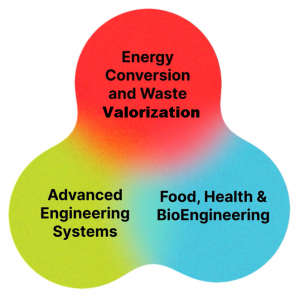The research activities are organized in 3 research topics: Energy Conversion and Waste valorization; Food, Health & BioEngineering; Advancing Engineering Systems.

Energy Conversion and Waste valorization
- Sustainable conversion technologies. Conversion of non-recyclable wastes to energy, specialty materials, biofuels, low-cost renewable catalysts. Thermochemical conversion: carbonization, gasification, kinetic parameters and testing of biofuels and electrified powertrains; H2 electrolysis of wastewaters and waste gasification.
- Energy efficiency strategies. Energy harvesting from waste heat. High density heat transfer technologies for cooling and energy systems. Thermoeconomic optimization of integrated energy and H2 systems.
- Energy efficiency in buildings. Dynamic energy and comfort modelling, conversion into ZEBs with optimal energy route.
- Extraction of value-added compounds. Sustainable production of energy crops. Orientation for circular economy by new composite materials, LCA.
Food, Health & BioEngineering
- Developing organ-on-a-chip (OC) platforms: advanced microfluidic technologies and microsensors for real-time monitoring and use 3D bioprinting to develop different kinds of bioinks for OC platforms and in vitro biomodels to study blood flow phenomena.
- Green chemistry to develop new bio-based and nanomaterials/nanofluids for various engineering fields from agro-food wastes, invasive algae species, and biomass wastes. The eco-friendly extraction of bioactive compounds from biomass is explored to replace fossil/synthetic compounds in food, pharmaceutical and other industries. The valorization of undervalued natural resources for human nutrition, and development of low sugar/low fat/low salt products will continue to be studied, to meet the industry/society demand.
Advancing Engineering Systems
- Use of advanced digital tools to delve the physical domain and the distributed control within engineering systems.
- Development of physical part of advanced engineering systems: exploration of mechanical structures applicable across various domains including machines'/vehicle structures and aerospace engineering systems.
- To study distributed control of automation systems, using/combining industrial communication protocols, manufacturing information modelling and advanced communication networks; using these technologies to support manufacturing processes, from design to quality control stages, towards zero-defect manufacturing.
- Cyber-physical production systems dependability will be studied: harnessing cutting-edge technologies such as digital twin, Internet of Things (IoT), data storing and management, machine learning and cyber-physical systems design, to find solutions for fully interoperability of cyber-physical systems



